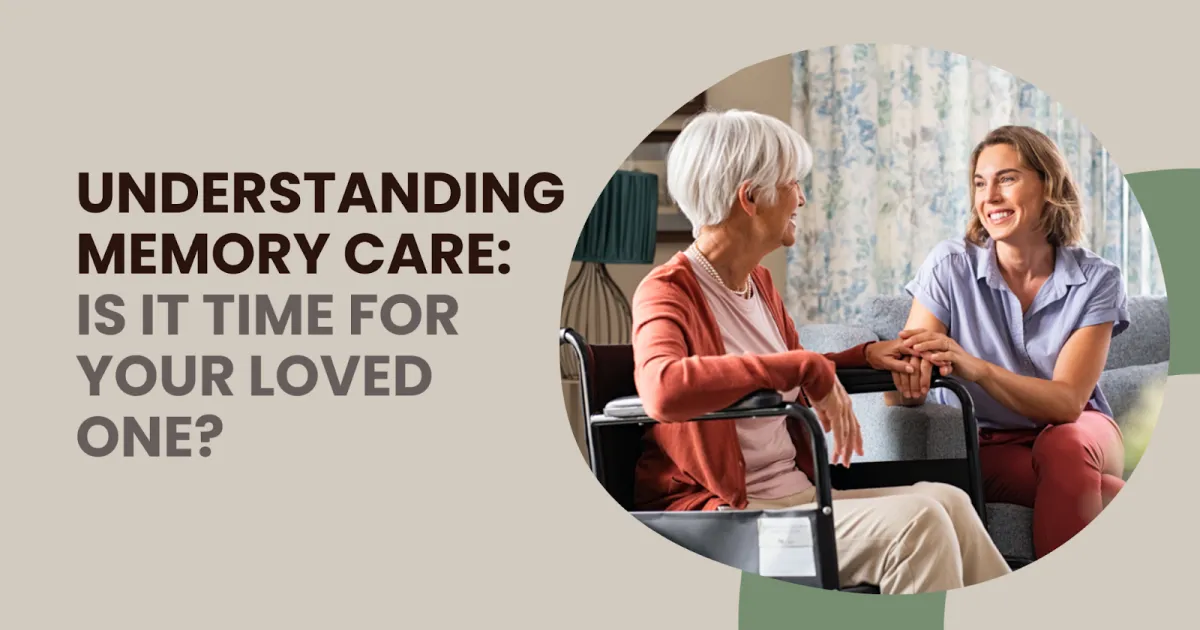
Understanding Memory Care: Is It Time for Your Loved One?
As we age, many of us experience a range of changes that impact our ability to live independently. One of the most challenging and concerning changes involves memory. For many families, it’s a struggle to see a loved one begin to forget important details or repeat themselves, yet not knowing when to seek help is equally troubling.
A few years ago, Maira found herself in that very situation with her father, who had begun to show signs of forgetfulness and confusion. At first, it seemed minor—losing his keys or forgetting appointments—but soon, the forgetfulness escalated, affecting his daily life and interactions. It was clear that something needed to be done, but what?
This is where memory care vs. assisted living becomes a crucial question. Families often wrestle with which type of care setting is appropriate when memory decline begins to impact daily life. In this guide, we’ll help you identify when it might be time for memory-focused support and how specialized care can improve both quality of life and family relationships.
What Is Memory Care?
Memory care is a specialized type of long-term care designed for individuals with Alzheimer’s disease and other forms of dementia. It provides structured environments, safety protocols, and programs that help residents maintain cognitive function. Compared to general senior housing, dementia care facilities offer increased supervision and activities designed to align with cognitive abilities.
For many families, especially those transitioning from assisted living for dementia patients, memory care provides a vital next step when additional attention and structure are needed.
Signs It's Time for Memory Care for Your Loved One
Knowing when to transition to more structured care requires attentiveness and a realistic look at your loved one’s daily challenges. Here are key signs it might be time to consider a move:
1. Increasing Forgetfulness and Confusion
One of the earliest signs that your loved one may need memory care is an increase in forgetfulness and confusion. If they are frequently misplacing everyday items like glasses, keys, or even food in the fridge, and they seem confused about their surroundings, it could be more than simple forgetfulness.
Memory care facilities are equipped to help individuals who struggle with these types of memory lapses, providing structured environments that support individuals in remembering and navigating their daily lives.
2. Difficulty Managing Personal Hygiene and Health
As memory deteriorates, so too can the ability to manage basic personal care. Forgetting to bathe, brush teeth, or take medications is a major red flag. For those with Alzheimer’s or dementia, personal hygiene becomes a challenging task, as they may no longer recognize its importance.
Memory care staff are trained to assist with personal hygiene routines, ensuring individuals maintain proper care and dignity, even when cognitive abilities begin to decline.
3. Behavioral Changes and Mood Swings
If you notice drastic shifts in your loved one's behavior, such as irritability, confusion, anxiety, or depression, it may indicate the need for memory care. These mood changes can arise as a result of the frustration and confusion of living with memory loss.
In a memory care environment, staff are trained to handle such behavior with compassion and specialized approaches to managing anxiety and agitation, offering a more stable and supportive environment.
4. Wandering and Safety Concerns
Wandering is a common behavior among individuals with memory loss, especially those suffering from Alzheimer’s. If your loved one has started wandering away from the house, forgetting where they are, or even getting lost in familiar places, safety becomes a major concern.
Memory care facilities are secure and provide a safe, enclosed space for individuals with memory impairment to move around freely without the risk of wandering or injury.
5. Inability to Manage Financial or Legal Affairs
As cognitive decline progresses, individuals may struggle to manage finances or handle legal responsibilities. If your loved one is frequently forgetting bills or making poor financial decisions, it could be time to consider professional help.
Memory care staff can support your loved one by helping manage finances and legal matters in a secure and organized environment, reducing the risk of confusion and stress.
6. Social Withdrawal and Isolation
Social interaction is important for mental health, but individuals experiencing memory loss may begin to withdraw from family, friends, or activities they once enjoyed. If your loved one has become increasingly isolated and refuses to participate in social activities, it may indicate the need for a more structured care environment.
Memory care facilities offer a community-oriented setting where individuals can interact with others in similar situations, helping to combat loneliness and provide emotional support.
Benefits of Early Care Intervention
While memory loss is often considered a progressive condition, intervening early can have a significant positive impact on your loved one’s quality of life. Here are some of the key benefits of early care intervention:
Opportunities for Therapy
When memory issues are identified early, therapeutic interventions such as cognitive therapy or physical therapy can be implemented more effectively. These therapies can help maintain mental function, slow down the progression of memory loss, and improve overall well-being.
Independence
Memory care services offer a balance between supporting independence and providing necessary assistance. Early intervention can help your loved one retain as much independence as possible while providing the needed care to ensure safety.
Personalized Health Plan
A modified health plan is developed for individuals in memory care, addressing their specific cognitive, physical, and emotional needs. Early intervention allows for a more personalized approach, helping to delay further cognitive decline and promote better overall health.
Nutritional Services
Proper nutrition plays a crucial role in maintaining brain function and overall health. Memory care facilities offer specialized dietary plans designed to meet the unique needs of individuals with memory issues, helping to improve their physical health and cognitive abilities.
Hobbies and Individuality
Memory care isn’t just about safety and health—it’s also about preserving individuality. With early intervention, caregivers can help your loved one engage in activities and hobbies they enjoy, ensuring they maintain a sense of purpose and personal identity.
Social Interaction
In memory care, socialization opportunities are modified to meet the needs of individuals with memory loss. Early intervention means your loved one can enjoy social activities that are both safe and enjoyable, reducing isolation and boosting mental and emotional health.
Caregiver Support
Memory care facilities also provide support for caregivers. Early intervention means that caregivers are less likely to experience burnout, as professional staff assist in providing care and managing difficult situations. This allows families to focus on enjoying time together rather than worrying about care needs.
A Healthier Relationship
By taking the step toward memory care early, families can enjoy a healthier, more positive relationship with their loved one. The added support helps reduce stress and creates a more supportive and compassionate environment for both the individual and their family members.
Financial Considerations
Choosing between memory care and assisted living involves careful budgeting. Here are the top 5 financial points to consider:
Level of Care Affects Cost
Memory care includes 24/7 supervision, cognitive support, and medical oversight, making it more expensive than standard assisted living.
Insurance and Medicaid Options
Some dementia care facilities accept Medicaid or long-term care insurance, which can ease out-of-pocket costs significantly.
Bundled vs. Itemized Pricing
Compare what’s included—some communities offer all-in-one pricing, while others charge separately for meals, meds, and activities.
Tax Benefits May Apply
Certain memory care expenses may be tax-deductible as medical costs—speak with a financial advisor about eligibility.
Ask About Payment Flexibility
Many facilities offer structured payment plans, financial consultations, or sliding scale options based on income and need.
Conclusion
It’s never easy to decide when a loved one needs more care. But waiting too long can increase risks and decrease the quality of life. Recognizing early signs and acting quickly gives your loved one the best chance at continued independence and meaningful interaction. From structured therapy to compassionate support, memory care provides a path forward that’s both safe and enriching.
If you’re seeing the signs, it may be time to explore care options that meet your loved one’s needs with dignity and expertise.
Schedule a consultation today at The Walnut Villa and explore the best path forward for your family.
FAQs
1. How does memory care differ from traditional assisted living?
Memory care offers specialized support for dementia and Alzheimer's with secure environments and 24/7 supervision. Assisted living provides general care without a focus on cognitive needs.
2. When is the right time to transition to memory care?
Transition to memory care when safety or daily care needs exceed what can be managed at home or in assisted living. Signs include frequent confusion and wandering.
3. Are residents allowed to personalize their living space?
Yes, most memory care facilities allow personal items like photos or furniture. Personalization helps create familiarity and reduces anxiety.
4. What types of therapy are typically included in memory care?
Memory care often includes cognitive, physical, and creative therapies such as music or art. These help maintain function and support emotional well-being.
5. Can memory care improve quality of life for the whole family?
Yes, memory care alleviates caregiver stress and confirms professional care. This can lead to healthier relationships and more quality time for families.

Facebook
Instagram